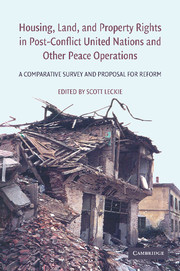 Housing, Land, and Property Rights in Post-Conflict United Nations and Other Peace Operations
Housing, Land, and Property Rights in Post-Conflict United Nations and Other Peace Operations Book contents
- Frontmatter
- Contents
- Contributors
- Acknowledgments
- Foreword by Dan Lewis
- I INTRODUCTION
- II CASE STUDIES
- 2 Stability, Justice, and Rights in the Wake of the Cold War: The Housing, Land, and Property Rights Legacy of the UN Transitional Authority in Cambodia
- 3 The Response of the United Nations Interim Administration Mission in Kosovo to Address Property Rights Challenges
- 4 Balancing Rights and Norms: Property Programming in East Timor, the Solomon Islands, and Bougainville
- 5 Housing, Land, and Property Restitution Rights in Afghanistan
- 6 Peacekeeping and HLP Rights in the Great Lakes Region of Africa: Burundi, Rwanda, and DR Congo
- 7 The Trouble with Iraq: Lessons from the Field on the Development of a Property Restitution System in “Post”-Conflict Circumstances
- 8 Sudan's Comprehensive Peace Agreement: An Opportunity for Coherently Addressing Housing, Land, and Property Issues?
- 9 The Impacts of UN Peace Operations on Local Housing Markets
- III CONCLUSIONS
- Index
3 - The Response of the United Nations Interim Administration Mission in Kosovo to Address Property Rights Challenges
Published online by Cambridge University Press: 15 July 2009
- Frontmatter
- Contents
- Contributors
- Acknowledgments
- Foreword by Dan Lewis
- I INTRODUCTION
- II CASE STUDIES
- 2 Stability, Justice, and Rights in the Wake of the Cold War: The Housing, Land, and Property Rights Legacy of the UN Transitional Authority in Cambodia
- 3 The Response of the United Nations Interim Administration Mission in Kosovo to Address Property Rights Challenges
- 4 Balancing Rights and Norms: Property Programming in East Timor, the Solomon Islands, and Bougainville
- 5 Housing, Land, and Property Restitution Rights in Afghanistan
- 6 Peacekeeping and HLP Rights in the Great Lakes Region of Africa: Burundi, Rwanda, and DR Congo
- 7 The Trouble with Iraq: Lessons from the Field on the Development of a Property Restitution System in “Post”-Conflict Circumstances
- 8 Sudan's Comprehensive Peace Agreement: An Opportunity for Coherently Addressing Housing, Land, and Property Issues?
- 9 The Impacts of UN Peace Operations on Local Housing Markets
- III CONCLUSIONS
- Index
Summary
Introduction
Over the past decade several commentators and UN human rights bodies have stressed the need for United Nations international peace keeping operations to address housing, land, and property (HLP) rights issues arising out of conflicts. It has been widely acknowledged that the resolution of HLP issues is centrally linked to post-conflict peacebuilding, reconciliation, and the sustainable return of refugees and internally displaced persons (IDPs). Further, the right of refugees and IDPs to return to their homes in their country or place of origin following a conflict has evolved significantly as a human rights norm.
Since the late 1990s, HLP rights issues have featured with increased frequency on the agenda of the UN and have been recognized as a central component of peacekeeping efforts. In this regard, the secretary-general's August 2004 report to the Security Council on the rule of law and transitional justice in conflict and post-conflict societies makes express reference to these issues. It explicitly recognizes as an essential component of the rule of law effective legal mechanisms for redressing property disputes that arise out of conflict, together with the need for restoring property rights or compensation where this is no longer possible. More recently, the report of the Sub-Commission on the Promotion and Protection of Human Rights, otherwise known as the “Pinheiro Principles” on Housing and Property Restitution for Refugees and IDPs, has expressly recognized the centrality of HLP rights challenges and restitution issues in post-conflict peacebuilding in the context of the return of refugees and IDPs.
- Type
- Chapter
- Information
- Housing, Land, and Property Rights in Post-Conflict United Nations and Other Peace OperationsA Comparative Survey and Proposal for Reform, pp. 61 - 102Publisher: Cambridge University PressPrint publication year: 2008


